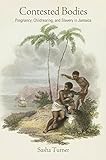Contested Bodies : Pregnancy, Childrearing, and Slavery in Jamaica / Sasha Turner.
Material type: TextSeries: Early American StudiesPublisher: Philadelphia : University of Pennsylvania Press, [2017]Copyright date: ©2017Description: 1 online resource (328 p.) : 10 illusContent type:
TextSeries: Early American StudiesPublisher: Philadelphia : University of Pennsylvania Press, [2017]Copyright date: ©2017Description: 1 online resource (328 p.) : 10 illusContent type: - 9780812249187
- 9780812294057
- 306.4 23
- online - DeGruyter
- Issued also in print.
| Item type | Current library | Call number | URL | Status | Notes | Barcode | |
|---|---|---|---|---|---|---|---|
 eBook
eBook
|
Biblioteca "Angelicum" Pont. Univ. S.Tommaso d'Aquino Nuvola online | online - DeGruyter (Browse shelf(Opens below)) | Online access | Not for loan (Accesso limitato) | Accesso per gli utenti autorizzati / Access for authorized users | (dgr)9780812294057 |
Browsing Biblioteca "Angelicum" Pont. Univ. S.Tommaso d'Aquino shelves, Shelving location: Nuvola online Close shelf browser (Hides shelf browser)

|

|

|

|

|

|

|
||
| online - DeGruyter Deportation : The Origins of U.S. Policy / | online - DeGruyter Food on the Page : Cookbooks and American Culture / | online - DeGruyter Dark Speech : The Performance of Law in Early Ireland / | online - DeGruyter Contested Bodies : Pregnancy, Childrearing, and Slavery in Jamaica / | online - DeGruyter Franciscans and the Elixir of Life : Religion and Science in the Later Middle Ages / | online - DeGruyter Modern Coliseum : Stadiums and American Culture / | online - DeGruyter Jews, Gentiles, and Other Animals : The Talmud After the Humanities / |
Frontmatter -- Contents -- Introduction: Transforming Bodies -- 1. Conceiving Moral and Industrious Subjects: Women, Children, and Abolition -- 2. "The Best Ones Who Are Fit to Breed": The Quest for Biological Reproduction -- 3. When Workers Become Mothers, Who Works? Motherhood, Labor, and Punishment -- 4. "Buckra Doctor No Do You No Good": Struggles over Maternal Health Care -- 5. "Dead Before the Ninth Day": Struggles over Neonatal Care -- 6. Mothers Know Best? Maternal Authority and Children's Survival -- 7. Raising Hardworking Adults: Labor, Punishment, and Slave Childhood -- Conclusion: Transforming Slavery -- Notes -- Sources -- Index -- Acknowledgments
restricted access online access with authorization star
http://purl.org/coar/access_right/c_16ec
It is often thought that slaveholders only began to show an interest in female slaves' reproductive health after the British government banned the importation of Africans into its West Indian colonies in 1807. However, as Sasha Turner shows in this illuminating study, for almost thirty years before the slave trade ended, Jamaican slaveholders and doctors adjusted slave women's labor, discipline, and health care to increase birth rates and ensure that infants lived to become adult workers. Although slaves' interests in healthy pregnancies and babies aligned with those of their masters, enslaved mothers, healers, family, and community members distrusted their owners' medicine and benevolence. Turner contends that the social bonds and cultural practices created around reproductive health care and childbirth challenged the economic purposes slaveholders gave to birthing and raising children.Through powerful stories that place the reader on the ground in plantation-era Jamaica, Contested Bodies reveals enslaved women's contrasting ideas about maternity and raising children, which put them at odds not only with their owners but sometimes with abolitionists and enslaved men. Turner argues that, as the source of new labor, these women created rituals, customs, and relationships around pregnancy, childbirth, and childrearing that enabled them at times to dictate the nature and pace of their work as well as their value. Drawing on a wide range of sources-including plantation records, abolitionist treatises, legislative documents, slave narratives, runaway advertisements, proslavery literature, and planter correspondence-Contested Bodies yields a fresh account of how the end of the slave trade changed the bodily experiences of those still enslaved in Jamaica.
Issued also in print.
Mode of access: Internet via World Wide Web.
In English.
Description based on online resource; title from PDF title page (publisher's Web site, viewed 26. Aug 2020)


